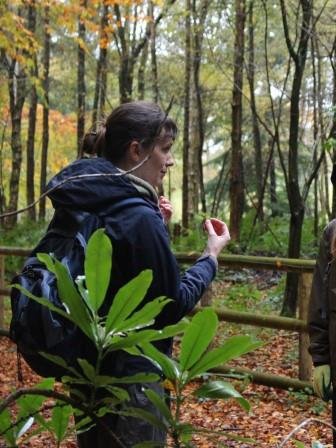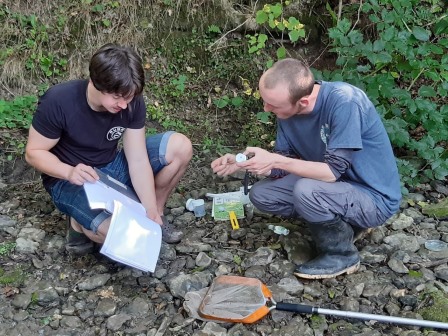An opinion piece on Internships/Traineeships and Careers in the Environmental Sector
This post is greater than 6 months old - links may be broken or out of date. Proceed with caution!
By Kat Hinton
I read an excellent article recently by Brian Heppenstall that got me reflecting, not only on the expectation for volunteering, but also careers generally within the environmental sector.

Last month I finished working on a youth engagement project with a local Wildlife Trust. I was working with young people between the ages of 11 and 24, to encourage them to work to improve their local environments. Last summer, towards the end of the first Lockdown, it became apparent that there was a desperate need to help recent graduates. They had all successfully completed their degrees in an environmental discipline, studying hard, and racking up the debt that goes with that. Now, young and enthusiastic, they were desperate to get out there and start working to improve the natural world that they had learnt so much about. But! First the sector expects them to get relevant experience by giving up their time for free.
Because we were in the middle of a pandemic, there were no opportunities for these young people to get any practical work experience at all. Even the regular conservation work parties with our Wildlife Trust had stopped. As we came out of that first lockdown, I worked hard to create opportunities for these young people to gain valuable experience, to gain skills that they could add to their CV’s. One young lady was lucky enough to be offered a traineeship, only partly funded, in another part of the country. In order to take up the opportunity she needed to relocate, find a place to live, and a part-time job to pay her rent. Because of the pandemic, there weren’t the usual opportunities to get jobs in pubs, for instance. She had to turn down the traineeship in the end as she just couldn’t afford to take it.
All of these young people, having left home to go to university, were now living back at home with parents. I became aware how much their mental health was suffering as the months went on, and they were finding it harder and harder to achieve any kind of work in this sector that they cared so passionately about. One young man, living at home, claiming Universal Credit was having no success with applications – even for traineeships – because he didn’t have a driving licence. Without a job he couldn’t afford driving lessons. A third youngster was lucky enough to have a part-time job in the local Co-op. He often couldn’t attend the opportunities I set up because of his shifts. He had a car and needed to earn money in order to run it.
Why do we make it so hard for these youngsters, so full of optimism, enthusiasm and ideas, to get a foothold in the sector? Over the years I have seen so many people that I know give up on these ideals and seek employment elsewhere, in education or healthcare, for instance. At this point, I would like to give my own example: I became passionate about conservation as a teenager and, over 20 years ago, after graduating I was successful in gaining a one-year full-time volunteer placement with a Wildlife Trust. I moved to the area, found a room to rent, and applied for Housing Benefit. I needed a car to get to the remote site where my placement would be based. My dad kindly offered to pay for my car insurance. I got myself a pub job in the evenings. I worked hard, learnt a lot, and loved the work. At the end of the year, despite applying for numerous jobs, I wasn’t successful in getting anything. Someone suggested I look for another volunteer role. I couldn’t afford that. I got a job in a local garden centre instead. After 9 months of that I realised that, with a degree from a top-class university, this was ridiculous. I applied to train as a teacher.

I taught for nearly 15 years but, throughout that time, my passion was always for conservation. I volunteered on various projects and did work for a short time as an Education Officer for a Wildlife Trust (taking a pay-cut to do so – more on that later). Seven years ago, I realised that, rather than just teach children about environmental issues when it briefly came up within the biology curriculum, I wanted to actively work to improve them. I used my small amount of savings to enrol on a master’s degree. At the end of this it took me over two years of applying for numerous posts before I finally got a job: working on the youth engagement project I have previously mentioned. The post was only funded for two years. Over the last six months of the project I was regularly applying for jobs, with no success.
This month I find myself unemployed for the first time in my life. And it is terrifying. One of my best friends has been quite insistent that I should consider going back to teaching. The pay is significantly better, as is the job security. I gave all of that up because I feel so passionately that I want to make a difference to the devastation I see being wreaked on our natural world. I can completely relate to those young graduates I was working with.
But why do we as a sector make it so very hard to get into the profession? For many roles there is an expectation that applicants have a degree, even a postgraduate qualification. And yet, the pay does not reflect that. Many of the entry-level roles pay between £17 000 and £19 000 per annum. For contrast, the starting salary for both a teacher and a nurse is approximately £25 000. Even roles for those with more experience within the environmental sector rarely pay as much as that. Current costs of living make it very hard to survive on these salaries: I saw an article by someone on LinkedIn stating that, after taking current average costs of rent and bills out of a salary of £24 000, a person would be left with approximately £200 a month for food and essentials. If you have any debt to pay, having bought a car or paid to get those all-important qualifications, this leaves a person with very little to live off. Are these low salaries really going to attract the best candidates for the job?
Within the sector there is a lot of talk about increasing diversity. If we really want to look at Equality, Diversity and Inclusion, I think we need to start by looking at how best we can ‘include’ those that already want to be part of it. Let’s look at funding. How can we fund paid training placements? How can we secure funding for posts with permanent contracts, that offer greater job security? Let’s look at clear career progression. How can we enable youngsters that participate in training schemes to get a job at the end of them? How can organisations fund CPD for people on short-term contracts, that increase the likelihood of continuing employment? How can organisations ensure that they are doing all that they can to listen to their employees and the aspirations they have for career progression?
I agree whole-heartedly with the points made in the article by Brian Heppenstall. Doesn’t our sector have a moral imperative to look at these issues around pay and job security? How many people are we excluding from access to the vital work that we are doing because of the expectation to give up time for free, or to accept low wages? Many of the organisations within the sector are charities that historically started out as small groups of passionate individuals. As the sector grows and develops, it’s time to be more professional in our outlook. Let’s make this the attractive profession we know it is. Only then will we increase the diversity of people who are willing, and able, to get involved. Only then will we really be able to make the difference that our natural world really needs.
It would be interesting to research the percentage of young graduates from degrees in conservation or other environmental disciplines that actually succeed in gaining employment within the environmental sector. There is so much work to be done. There is a triple crisis going on: climate, biodiversity, and disconnect from nature. I read about the latest reports on the state of our rivers, our trees, our national parks, freak weather events. So much to be done, so much talent and enthusiasm, so many people who actively want to work make improvements. And yet?!
(By the way, I have now got a job: hang in there if you’re still looking too!)
If you want to get in touch with Kat please email Kat_Hinton2004@hotmail.com
More from Kat Hinton